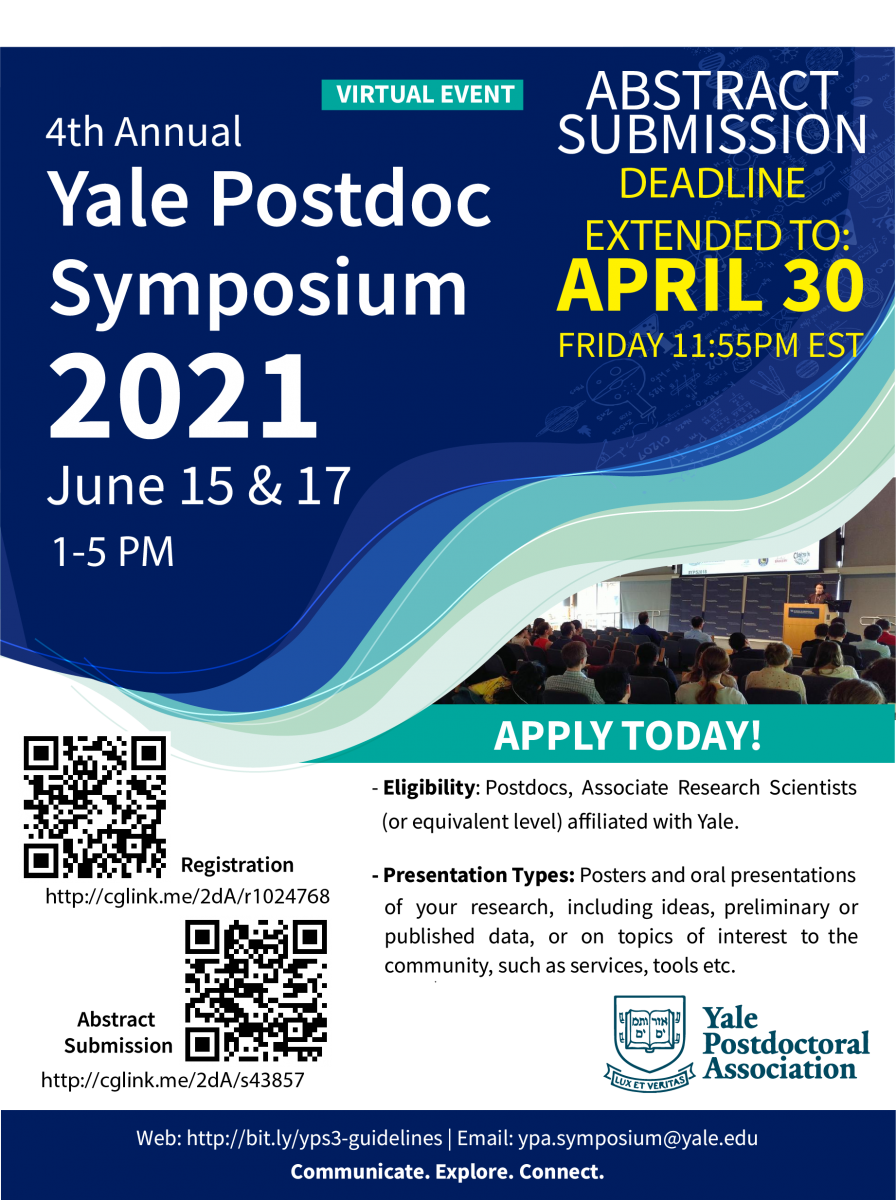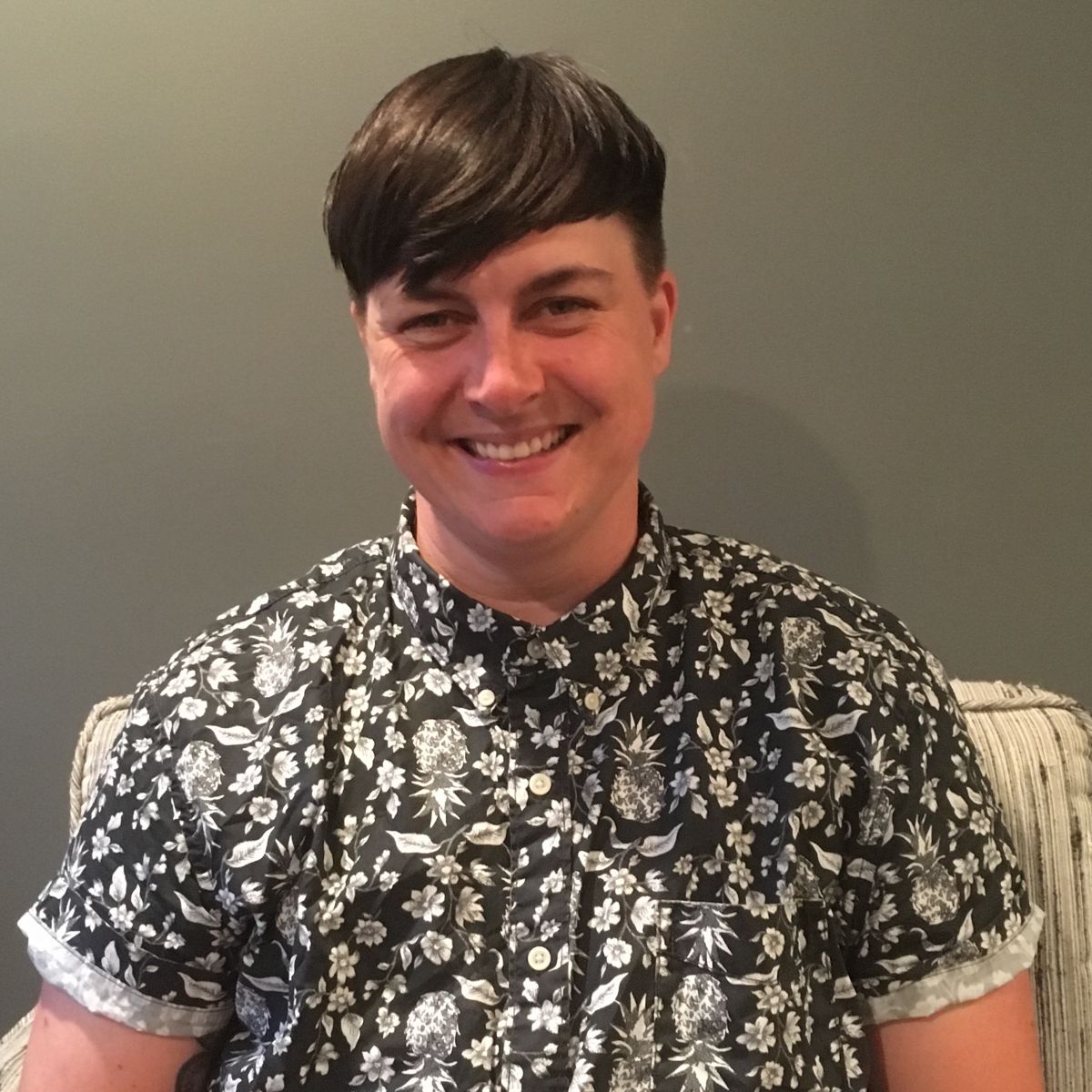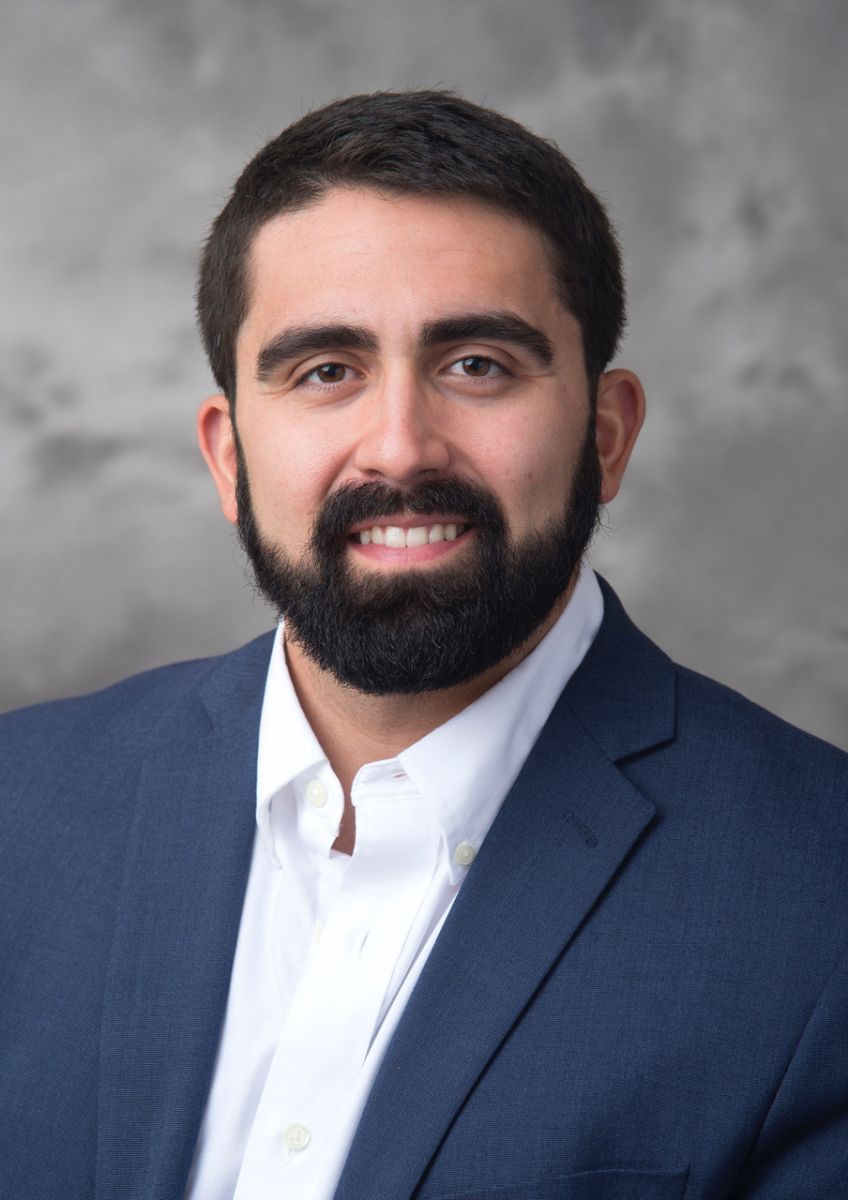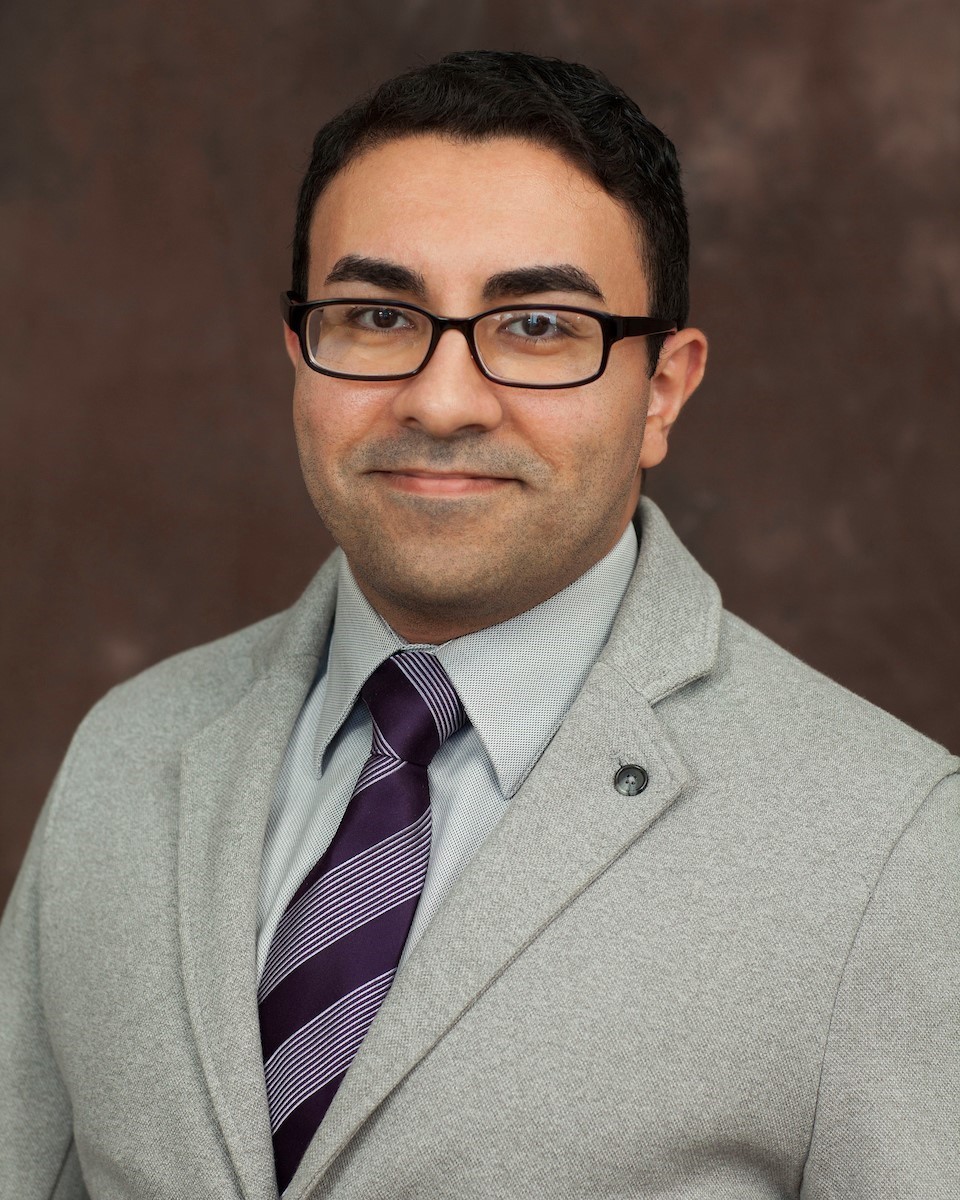4th Annual Postdoc Symposium
We invite you to the 4th Annual Postdoc Symposium to be held ONLINE on Tuesday, June 15th, and on Thursday, June 17th, 2021. The symposium welcomes Postdocs and Associate Research Scientists (ARS) from all departments and fields of research to present their work to the Yale research community. This event is sponsored by the Yale Postdoctoral Association and is free for postdocs and ARS.
Please register to attend our virtual 4th Annual Postdoc Symposium and consider submitting an abstract by Friday, April 30th, 2021.
Communicate. Explore. Connect.
This symposium is a great opportunity for professional development and networking within the Yale community. The goals of this event are for you to:
- Communicate your research
- Explore the diversity of postdoctoral research performed at Yale
- Connect with other postdocs
This event is designed to increase the visibility of Postdoc Research at Yale. It will focus on the diversity of our community and our contribution to the research excellence at Yale. It will be a great way for you to discover new fields of research, connect with unexpected future collaborators in other departments, and increase your network in the research community. This event gives a unique opportunity to get more out of your Yale experience than spending days and nights in the lab.

Program
Day 1 - Tuesday, June 15th, 2021, 1 - 5 PM ET
| time | activity | speaker | title |
|---|---|---|---|
| 1:00-1:10pm | Opening remarks | Anna York and Nicole Lake | |
| 1:10-2:15pm |
Session 1 - Chair: Ludmila Peres Diaz |
||
| 1:10pm | 10 min talk #1 |
Flavio De Angelis
|
Genome-wide investigation of the interplay between age-related hearing loss, smoking behaviors, and noise pollution |
| 1:25pm | Flash talk #1 | Dora Koller | Identifying the impact of evolutionary processes in shaping the genetics of complex traits in Japanese population |
| 1:30pm |
Flash talk #2
|
Jeffery Tharp | Expanding the genetic code |
| 1:35pm | 10 min talk #2 | Veronica Weser | Developing a Multiplayer Dating Game to Empower Black Teen Girls |
| 1:50pm | Flash talk #3 | Brooke Bennett | Body-image concerns and associated impairment among adults seeking body contouring following bariatric surgery |
| 1:55pm | Flash talk #4 | Cortney Simmons | Youth experiences with the 2020 Black Lives Matter demonstrations in the United States |
| 2:00pm | 10 min talk #3 | Jocelyn Hoye | A new endpoint in preclinical and early phase central nervous system drug trials: EC50 images reveal spatial variation in apparent affinity |
| 2:15-3:00pm | Poster session #1 (odd numbers via Gather.town) | ||
| 3:00-4:00pm | Session 2 - Chair: Nicole Lake | ||
| 3:00pm | 10 min talk #1 | Anna York | A cell separation method for pneumococcal serotypes |
| 3:15pm | Flash talk #1 | Tiffany Fitzpatrick | The effect of regional geographic mixing on the spatial and temporal dynamics of respiratory syncytial virus (RSV) |
| 3:20pm | Flash talk #2 | Stephanie Perniciaro | Too many cooks: Associations between state-level COVID-19 testing recommendations, tests per capita, undercounted deaths, vaccination policies, and vaccine doses per capita in the United States |
| 3:25pm | Flash talk #3 | Anderson Brito | Multiple introductions of the SARS-CoV-2 B.1.1.7 variants into the US |
| 3:30pm | 10 min talk #2 | Karen Chen | Characterizing urbanization in mountainous regions using machine learning and time-series satellite images |
| 3:45pm | Flash talk #4 | Alexander Dufford | The Instability of Functional Connectomes Across the First Year of Life |
| 3:50pm | Flash talk #5 | Hellen Weinschutz Mendes | Functional analysis of ASD risk genes in zebrafish reveals a series of convergent and divergent phenotypes |
| 3:55pm | Flash talk #6 | Orchid Allicock | SalivaDirect: A simplified and flexible platform to enhance SARS-CoV-2 testing capacity |
| 4:00-5:00pm | Panel discussion | Greta LaFleur, Fernando Tormos-Aponte and Michael Awad | With Great Power comes Great Responsibility: How to Incorporate Activisim into your Career |
Day 2 - Thursday, June 17th, 2021, 1 - 5 PM ET
| time | activity | speaker | title |
|---|---|---|---|
| 1:00-1:05pm | Introduction | Anna York and Nicole Lake | |
| 1:05-2:15pm |
Session 1 - Chair: Isabella Graf |
||
| 1:05pm | 10 min talk #1 | Brenda Cabrera-Mendoza | Causal association of anthropometric and socioeconomic traits with COVID-19 |
| 1:20pm | Flash talk #1 | Julián Acosta | Polygenic Susceptibility to Hypertension is Associated with Uncontrolled and Resistant Hypertension in Stroke Survivors |
| 1:25pm |
Flash talk #2
|
Natalia Szejko | Mendelian Randomization Analyses of Vitamin D Levels and Risk of Spontaneous Intracerebral Hemorrhage |
| 1:30pm | 10 min talk #2 | Jialiu Zeng | Nanoparticles restore lysosomal acidification and rescues autophagy and metabolic dysfunction in Non-alcoholic fatty liver disease |
| 1:45pm | Flash talk #3 | Mohsen Nami | CMOS-Compatible Silicon-Nanoribbons Field-Effect Transistors: A Point-Of-Care Testing for SARS-CoV-2 Vaccine Efficacy Measurement |
| 1:50pm | Flash talk #4 | R. Kim | Redox Potential Measurements of Cerium Oxide Nanoparticles for Mitigating Oxidative Stress |
| 1:55pm | 10 min talk #3 | Benedek Kurdi | A robust implicit bias against individuals labeled as non-American |
| 2:10pm | Flash talk #5 | Frank Wendt | Comorbid-phenome prediction and phenotype risk scores increase data availability for anxiety and PTSD gene discovery |
| 2:15-3:00pm | Poster session #2 (even numbers via Gather.town) | ||
| 3:00-4:00pm | Session 2 - Chair: Christopher JF Cameron | ||
| 3:00pm | 10 min talk #1 | Christian Ruiz | Identifying dietary drivers of pancreatic cancer |
| 3:15pm | Flash talk #1 | Danielle Peterson | Bradycardia in alopecia areata: a new autoimmune arrhythmia? |
| 3:20pm | Flash talk #2 | Chih Hung Lo | Adenosine A2A receptor signaling in astrocytes contributes to multiple sclerosis (MS) progression |
| 3:25pm | Flash talk #3 | Jenna DiRito | Patterns and inhibition of cell death during static cold storage of human kidneys |
| 3:30pm | 10 min talk #2 | Sounak Ghosh Roy | Loss of Dnajb11 results in preweaning lethality and polycystic kidneys with Polycystin-1 genetic interaction |
| 3:45pm | Flash talk #4 | Pratap Vydyam | in vitro and in vivo efficacy of Antifolates on Human Babesiosis |
| 3:50pm | Flash talk #5 | Marco Galimberti | Genetics shared by Alcohol Use Disorder and Heaviness of Smoking |
| 3:55pm | Flash talk #6 | Gita Pathak | Multi-omics investigation of prefrontal cortex for symptom clusters of posttraumatic stress disorder in US veteran population |
| 4:00-4:50pm | Key Note | Ericka Boone | Combating Burnout Through Self-Care |
| 4:50-5:00pm | Awards and closing remarks | Anna York and Nicole Lake | |
| 6:00-7:00pm | In-person socials | (sign up required) link | |
Keynote
We are excited to announce Dr. Ericka Boone as the key note speaker for this year’s symposium, who will speak on Combating Burnout Through Self-Care.
|
Dr. Ericka Boone, Director, NIH Division of Loan Repayment
Acting Director, NIH Division of Biomedical Research Workforce
|
| Ericka Boone, Ph.D. is the Director of the NIH Division of Loan Repayment. In this role, Dr. Boone is responsible for administering and providing leadership for the NIH Loan Repayment Programs (LRPs) as well as representing NIH on matters related to the operations, policy development and evaluation of the LRPs. Prior to this position, Dr. Boone served as a Health Scientist Administrator in the Office of Science Policy and Communications at the National Institute on Drug Abuse (NIDA) where she developed and targeted science-based publications, outreach initiatives and other activities to educate a variety of audiences about the science of drug use, abuse and addiction. Dr. Boone’s academic background includes a B.A. in Biology from Talladega College and a Ph.D. in Biobehavioral Health from The Pennsylvania State University. |
Panel Discussion
In collaboration with the YPA Racial Justice Subcommittee and the Yale Black Postdoc Association, we will be hosting a panel discussion with Greta LaFleur, Fernando Tormos-Aponte and Michael Awad called 'With Great Power comes Great Responsibility: How to Incorporate Activism into your Career'. Unfortunately, the additional challenges faced by underrepresented minority researchers are varied and numerous; having open conversation about how to tackle the many issues society faces, are the very foundation of change. Therefore whether you are already involved in activism, are looking to gain a better understanding of these issues and/or find out what you can do to help, we would like to hear from you and hope to see you there.
|
Greta LaFleur |
| Greta LaFleur is Associate Professor of American Studies at Yale University, the author of The Natural History of Sexuality in Early America (2018) and the editor of the forthcoming Trans Historical: Gender Plurality Before the Modern (Cornell UP, 2021), among others. Her current book, A Queer History of Sexual Violence, is under contract with The University of Chicago Press. |
|
Fernando Tormos-Aponte |
| Fernando Tormos-Aponte is an Assistant Professor of Public Policy and Political Science at the University of Maryland Baltimore County, a Kendall Fellow at the Union of Concerned Scientists, and a Visiting Scholar at the Johns Hopkins University Department of Political Science. He earned his MA and PhD in Political Science from Purdue University, West Lafayette, and a BA from the Universidad de Puerto Rico—Río Piedras. Dr. Tormos-Aponte specializes in environmental and racial justice, intersectional solidarity, identity politics, social policy, and transnational politics. Tormos-Aponte’s research is situated in two areas of inquiry. Inspired by the devastating toll that hurricanes Irma and María had on his native Puerto Rico, Tormos-Aponte investigates civil society claims about the uneven government response across communities. His work in this area examines the causes and consequences of government neglect of socially vulnerable communities during disaster recoveries. Tormos-Aponte’s work also investigates how marginalized groups organize to address their societal needs. He seeks to understand the drivers and consequences of building solidarity across social group differences and how social movements develop an intersectional organizing approach. Tormos-Aponte’s work has appeared in Social Politics, Politics, Groups, and Identities, Environmental Policy and Governance, Public Administration Review, Alternautas, PS: Political Science and Politics and in the edited books Latinas and the Politics of Urban Spaces, Gendered Mobilizations, and The Legacy of Second-Wave Feminism in American Politics. He is currently working on projects on intersectional solidarity, the Black Lives Matter movement, environmental justice, transnational social movements, and activism in Puerto Rico. His public writing has appeared in The New York Times, The Washington Post, Scientific American, Union of Concerned Scientists Blog, Nueva Sociedad, Jacobin, In These Times, London School of Economics United States Politics and Policy Blog, Undisciplined Environments, and Latino Rebels. |
|
Michael Awad |
| Michael Awad is a postdoctoral research fellow in the Division of Prevention and Community Research in the Psychiatry Department at Yale University. He is a trained counseling psychologist and school counselor and his research focuses improving access to and engagement with prevention and mental health services for underserved youth in school settings. He was the recent recipient of the American Psychologist Association’s Award for Research on Men of Color. Over his career, Mike has spent several years engaging with students and administrations in schools to create policies, programs, and spaces where youth can improve mental health and wellbeing. |
The 2020 - 2021 organizers:
The 4th Annual YPA Postdoc Symposium was made possible by a team of exceptional postdocs. They invested their precious time to ensure this event promotes the research of Yale postdocs and ARS from all departments.
The organizers (coordinators are bolded):
- Christopher JF Cameron
- Marco Galimberti
- Lama Ghazi
- Isabella Graf
- Jiexi Huang
- Nicole Lake
- Natasha Pinto Medici
- Prakruti Pandya
- Ludmila Peres Diaz
- Gianantonio Pezzullo
- Jeffery Tharp
- Anna York



